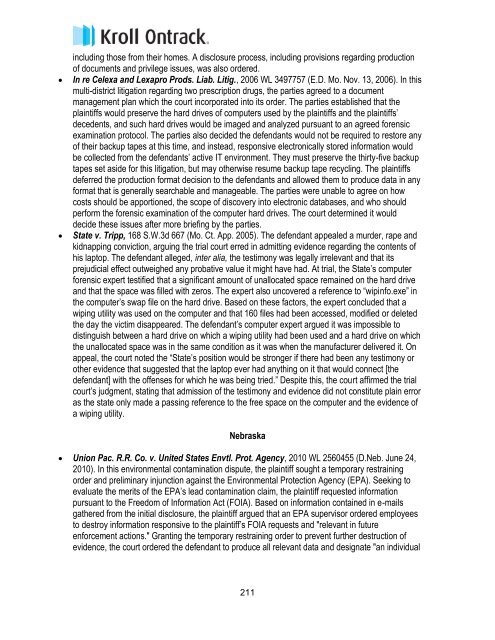Electronic Discovery and Computer Forensics Case List - Kroll Ontrack
Electronic Discovery and Computer Forensics Case List - Kroll Ontrack
Electronic Discovery and Computer Forensics Case List - Kroll Ontrack
You also want an ePaper? Increase the reach of your titles
YUMPU automatically turns print PDFs into web optimized ePapers that Google loves.
including those from their homes. A disclosure process, including provisions regarding production<br />
of documents <strong>and</strong> privilege issues, was also ordered.<br />
� In re Celexa <strong>and</strong> Lexapro Prods. Liab. Litig., 2006 WL 3497757 (E.D. Mo. Nov. 13, 2006). In this<br />
multi-district litigation regarding two prescription drugs, the parties agreed to a document<br />
management plan which the court incorporated into its order. The parties established that the<br />
plaintiffs would preserve the hard drives of computers used by the plaintiffs <strong>and</strong> the plaintiffs’<br />
decedents, <strong>and</strong> such hard drives would be imaged <strong>and</strong> analyzed pursuant to an agreed forensic<br />
examination protocol. The parties also decided the defendants would not be required to restore any<br />
of their backup tapes at this time, <strong>and</strong> instead, responsive electronically stored information would<br />
be collected from the defendants’ active IT environment. They must preserve the thirty-five backup<br />
tapes set aside for this litigation, but may otherwise resume backup tape recycling. The plaintiffs<br />
deferred the production format decision to the defendants <strong>and</strong> allowed them to produce data in any<br />
format that is generally searchable <strong>and</strong> manageable. The parties were unable to agree on how<br />
costs should be apportioned, the scope of discovery into electronic databases, <strong>and</strong> who should<br />
perform the forensic examination of the computer hard drives. The court determined it would<br />
decide these issues after more briefing by the parties.<br />
� State v. Tripp, 168 S.W.3d 667 (Mo. Ct. App. 2005). The defendant appealed a murder, rape <strong>and</strong><br />
kidnapping conviction, arguing the trial court erred in admitting evidence regarding the contents of<br />
his laptop. The defendant alleged, inter alia, the testimony was legally irrelevant <strong>and</strong> that its<br />
prejudicial effect outweighed any probative value it might have had. At trial, the State’s computer<br />
forensic expert testified that a significant amount of unallocated space remained on the hard drive<br />
<strong>and</strong> that the space was filled with zeros. The expert also uncovered a reference to “wipinfo.exe” in<br />
the computer’s swap file on the hard drive. Based on these factors, the expert concluded that a<br />
wiping utility was used on the computer <strong>and</strong> that 160 files had been accessed, modified or deleted<br />
the day the victim disappeared. The defendant’s computer expert argued it was impossible to<br />
distinguish between a hard drive on which a wiping utility had been used <strong>and</strong> a hard drive on which<br />
the unallocated space was in the same condition as it was when the manufacturer delivered it. On<br />
appeal, the court noted the “State’s position would be stronger if there had been any testimony or<br />
other evidence that suggested that the laptop ever had anything on it that would connect [the<br />
defendant] with the offenses for which he was being tried.” Despite this, the court affirmed the trial<br />
court’s judgment, stating that admission of the testimony <strong>and</strong> evidence did not constitute plain error<br />
as the state only made a passing reference to the free space on the computer <strong>and</strong> the evidence of<br />
a wiping utility.<br />
Nebraska<br />
� Union Pac. R.R. Co. v. United States Envtl. Prot. Agency, 2010 WL 2560455 (D.Neb. June 24,<br />
2010). In this environmental contamination dispute, the plaintiff sought a temporary restraining<br />
order <strong>and</strong> preliminary injunction against the Environmental Protection Agency (EPA). Seeking to<br />
evaluate the merits of the EPA’s lead contamination claim, the plaintiff requested information<br />
pursuant to the Freedom of Information Act (FOIA). Based on information contained in e-mails<br />
gathered from the initial disclosure, the plaintiff argued that an EPA supervisor ordered employees<br />
to destroy information responsive to the plaintiff’s FOIA requests <strong>and</strong> "relevant in future<br />
enforcement actions." Granting the temporary restraining order to prevent further destruction of<br />
evidence, the court ordered the defendant to produce all relevant data <strong>and</strong> designate "an individual<br />
211

















